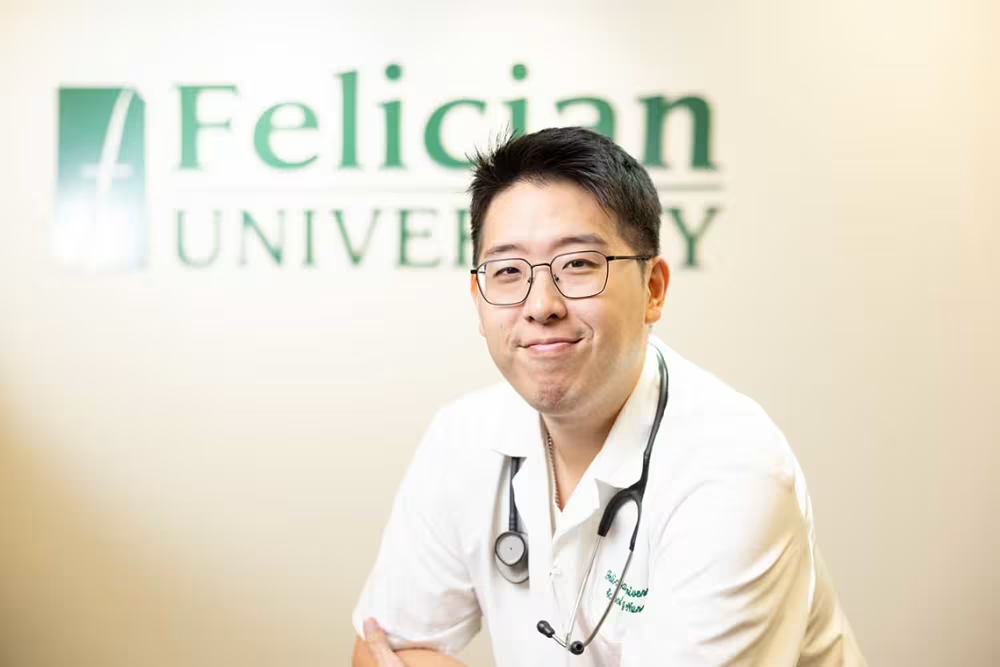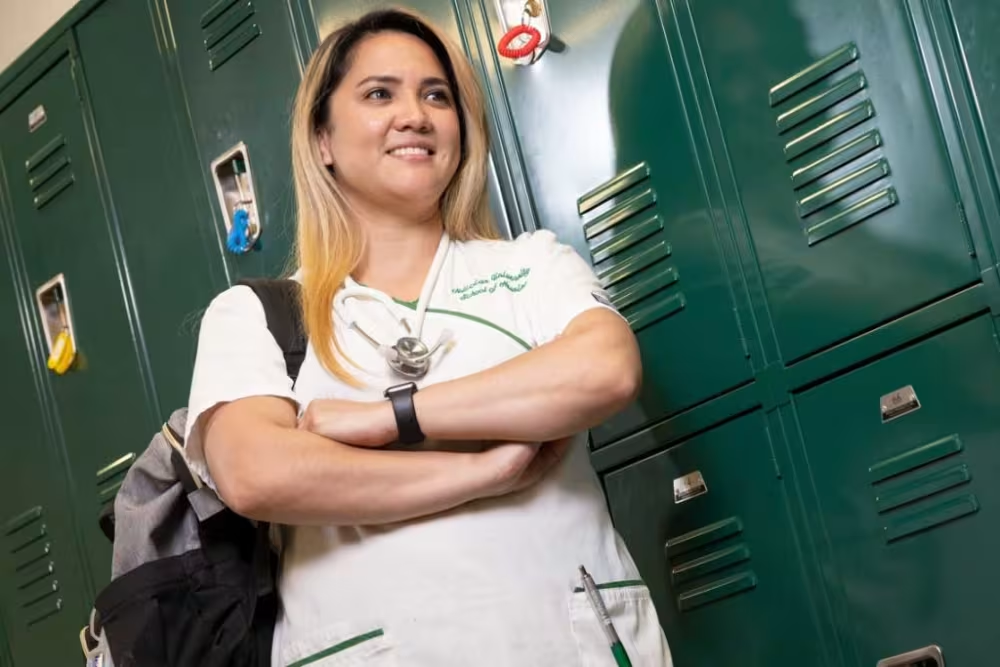Nursing School Requirements: A Guide to Becoming a Nurse
Each blog post is dated and contains accurate information as of that date. Certain information may have changed since the blog post publication date. If you would like to confirm the current accuracy of blog information, please visit our ABSN overview page or contact admissions at (844) 347-2497.
There are several requirements to become a nurse. First, you’ll need to meet nursing school requirements to enroll, including completing prerequisites, writing a letter of intent, and submitting transcripts. Then, you’ll need to earn a nursing degree, pass the NCLEX, and obtain your state-issued nursing license.

You don’t need perfect grades to apply to nursing school, nor do you need healthcare experience. If you are a career changer who is looking at accelerated programs, nursing school requirements typically include having a B-grade average, submitting an application with references, and completing prerequisites.
At Felician University, our Hybrid Accelerated Bachelor of Science in Nursing (ABSN) program and our On-Ground ABSN program offer a fast pathway toward a nursing career.
If you aren’t sure whether you meet our nursing program requirements, an admission counselor can review your qualifications and put together a personalized plan to help you meet them.
First, you’ll need to know which nursing degree is right for you. Then, you must meet the nursing school requirements, followed by the licensure requirements to become a nurse after graduation.
1. A Nursing Degree
There are two main nursing degree options: the Associate Degree in Nursing (ADN) and the Bachelor of Science in Nursing (BSN). There are also two main ways of earning a BSN: with a traditional BSN program or an ABSN program.

Associate Degree in Nursing
An ADN typically takes two years of full-time study to complete. It qualifies you to sit for the NCLEX-RN, but keep in mind the curriculum is not as in-depth or as broad in scope as the curriculum for a BSN program. An ADN also does not qualify you to apply to graduate school to earn an advanced degree and limits career advancement opportunities.
Traditional BSN Program
A traditional BSN program requires four years of full-time study. Compared to the ADN, the curriculum is far more comprehensive and rigorous. This means that BSN-prepared nurses can be more effective in the workplace and better prepared to help their patients.
In addition, a BSN provides the foundation for pursuing graduate-level nursing degrees and career advancement opportunities.

What are the other advantages of a BSN? Learn why it’s important for your career.
ABSN Program
An ABSN program confers a BSN, but it provides a faster pathway toward graduation compared to a traditional BSN program. ABSN programs reduce or eliminate general education requirements, focusing on nursing education instead.
This is possible thanks to the nursing program requirements, which include a completed non-nursing degree or a minimum number of non-nursing college credits. In addition, the accelerated pathway is facilitated by the consecutive semesters, with no summer vacation in between.
During the ABSN program at Felician University, you’ll learn through three modalities to ensure that you receive a well-rounded nursing education:
- Nursing coursework: These foundational nursing courses are where you’ll learn knowledge that you’ll later apply to real patients. In the Hybrid ABSN, these courses take place through an intuitive e-learning platform, while the On-Ground ABSN uses in-person lectures.
- Skills and simulation labs: These are in-person labs. Skills labs teach the technical nursing skills you’ll need as a nurse. In simulation labs, you’ll work with patient simulator manikins to practice various nursing scenarios under the supervision of your instructor.
- Clinical rotations: Clinicals offer the chance to hone your skills in a real healthcare environment. With the guidance of your instructor, you’ll gain experience working with patients in a variety of clinical environments.
What is an ABSN program? Take a closer look at the pathway.

2. Nursing Program Requirements
Before you can earn a BSN at Felician University, you’ll need to meet our nursing school requirements. Your dedicated admissions counselor will guide you through the admissions process and help you create a plan for becoming a competitive applicant.
Our nursing school requirements include:
- A completed non-nursing bachelor’s degree or at least 60 non-nursing college credits from an accredited school
- A minimum GPA of 3.0 in all undergraduate coursework
- A resume and letter of intent
- Two professional or academic references
- Fulfillment of prerequisite courses
Prerequisites
The nursing school prerequisites must be completed within 10 years of your intended ABSN start date. You must demonstrate a grade of C+ or better. The nursing school prerequisites are:
- Anatomy and Physiology I and II with lab
- Lifespan Development
- Microbiology with lab
- Pathophysiology
- Principles of Chemistry with lab
- Statistics I

In addition, you must demonstrate fulfillment of general education requirements, which might be waived depending on your prior education. These prerequisites include:
- Communication and Expression
- Critical and Analytical Thinking
- Ethics, Values, and Truth
- Faith and Reason
- Global Consciousness
- Information Literacy
- Liberal Arts
- Quantitative and Scientific Reasoning
- Technological Acumen
Application Package
While you’re wrapping up your prerequisite courses, you should focus on putting together the application package. You’ll need to have your official transcripts sent from your prior institution(s) to Felician University.
In addition, you’ll need two letters of reference from professional and/or academic sources and an updated resume. You’ll also need to write a letter of intent, also known as an admissions essay.

3. Passing Score on the NCLEX
After graduating from nursing school, you must pass the NCLEX. This exam is challenging because it tests everything you learned in nursing school, as well as your clinical reasoning, critical thinking, and decision-making skills. You’ll need to decipher which answer is the “most correct” even when multiple answers are technically correct.
Passing the NCLEX requires significant time and effort. You’ll start building the foundation at the beginning of nursing school. Most students spend extra time studying for the NCLEX during the last semester of nursing school. After graduation, plan to take a month or two to study full-time before test day.
4. Registered Nurse License
While every nursing graduate must pass the NCLEX to become a registered nurse, the licensure process tends to vary from state to state. Follow the procedures for your state’s board of nursing. Once you pass the NCLEX and meet any other requirements for your state, you’ll be eligible to receive your registered nursing license and start looking for your first nursing job.
5. Clinical Competence
Because nurses play a key role in patient health and safety, excellent clinical skills are essential. Nursing requires you to have a nursing degree and license, but you also need to apply your knowledge effectively in the real world.
The first steps you take toward clinical competence come through nursing school lab experiences, including skills and simulation labs. Then, you’ll develop clinical skills in a real-world nursing environment through clinical rotations. You’ll continue to enjoy learning opportunities throughout your career, which can improve your clinical competence.

Want to know how to become a nurse in NYC? Follow these four steps to make your nursing career a reality.
Ready to Get Started?
If you have a non-nursing bachelor’s degree or at least 60 non-nursing college credits, you meet the basic nursing program requirements at Felician University. You can choose our 16-month Hybrid ABSN program in Parsippany, NJ, or our 16-month On-Ground ABSN program in Rutherford, NJ, both of which combine nursing coursework with skills and simulation labs and clinical rotations.
Contact our admission team to learn more about what you need to do to apply. We’ll walk you through the process step by step.
